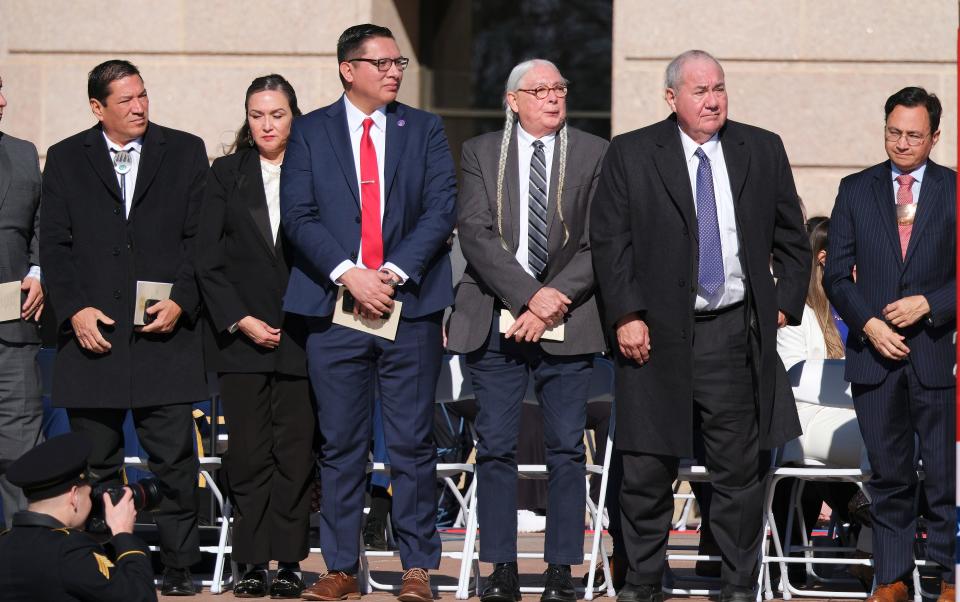Six key moments defining Oklahoma's relationship with Native tribes under Gov. Kevin Stitt
- Oops!Something went wrong.Please try again later.
Oklahoma Gov. Kevin Stitt was elected in 2018 to cheers from Indian Country. He was the first Cherokee Nation citizen elected to the state’s highest office, and the second Native American to lead any state.
As the founder of a mortgage company, Stitt cast himself as a political outsider and pledged to change Oklahoma for the better. His ambitious plans to improve life for everyday Oklahomans attracted early support from many tribal leaders, who shared similar goals.
But the relationship status between Stitt’s office and tribal nations quickly changed to “It’s complicated.” Here are the key moments that have shaped Stitt’s record on working with tribal nations so far, starting with a stunning op-ed.
Let’s renegotiate the state-tribal gaming agreement
That was the message Stitt delivered in a July 2019 opinion piece in the Tulsa World. The governor contended Oklahoma should get a bigger cut of tribal gaming proceeds. Tribes had paid the state $148.2 million in exclusivity fees that year.
Stitt’s column sent shockwaves across Oklahoma:
Many tribal leaders said they had no advance notice of the governor’s stance.
They also believed, along with state legislators, the 2004 gaming compact had automatically renewed.
The dispute set off a string of lawsuits that continues today.
Courts ultimately ruled against the governor’s bid to redo the main gaming compact. But Stitt was able to negotiate standalone gaming agreements with four tribes. The fate of those deals is tied up in court.
More:Many states allow legal sports betting. Why not Oklahoma?
Divide deepens over reservation lands
The Supreme Court decided in July 2020 that the Muscogee Nation’s reservation still existed in eastern Oklahoma. The landmark McGirt v. Oklahoma ruling stemmed from a criminal case, changing who had the power to prosecute cases on tribal lands. Justices trusted state officials and tribal leaders could work together to resolve the tricky questions that would arise.
Instead, the next year played out with Stitt and tribal leaders on opposite paths:
The governor denounced the decision, which stemmed from a criminal case, as an “existential threat” to Oklahoma’s authority. He worked to reverse or limit it.
Tribal leaders viewed the ruling as an affirmation of their inherent governmental rights. The Cherokee, Chickasaw, Choctaw, Muscogee, Quapaw and Seminole nations expanded their criminal justice systems after the decision was applied to their reservations.
Government-to-government talks dropped off.
Hunting and fishing for the next disagreement
Before the Oklahoma Department of Wildlife Conservation ever became famous on Twitter, it was partnering with tribes. The Cherokee and Choctaw nations — the two largest tribes in Oklahoma — agreed to work with the state on shared goals and to buy state hunting and fishing licenses for their citizens. The bigger license pool qualified Oklahoma for more federal funding.
But the deals fell apart in December 2021:
The tribes had agreed to pay $2 for each license.
Stitt wanted to start charging the full sticker price of $42 or more.
The governor repeated his criticism of McGirt v. Oklahoma, saying the lower price was unfair to people who weren’t tribal citizens.
To the tribes, the counter offer was a no-go.
Instead, soon after, the Cherokee and Choctaw nations launched their own hunting and fishing programs. The Chickasaw Nation followed suit in 2022.
Lawmakers say yes after Stitt says no
The rift with the governor’s office never extended to the Oklahoma Legislature, where tribal nations have strong allies, especially among lawmakers who represent areas where tribes have large payrolls and health care systems.
In May 2022, lawmakers approved a bill to recognize driving penalties imposed by tribal courts statewide. Stitt vetoed the measure. The state House and Senate voted overwhelmingly to override him, and the bill became law.

A second Supreme Court decision, then a tense campaign
Supreme Court justices did not overturn McGirt v. Oklahoma, but they did reel it in after hearing a state appeal. Their June 2022 ruling allowed the state to resume prosecuting some crimes involving Native Americans on reservations.
It also raised more questions about state authority on tribal lands, drawing criticism from Indian law scholars across the country. Stitt described it as a win for Oklahoma.
The sharp divisions set the stage for a tense election cycle as Stitt ran for a second term in office.
The Five Tribes — the Cherokee, Chickasaw, Choctaw, Muscogee and Seminole nations — formally endorsed Stitt’s general election opponent, Joy Hofmeister. Several other tribal nations also backed Hofmeister.
Stitt countered that he believed “casino bosses” were funding dark money ads attacking his record.

A ‘new day’ for Oklahoma-tribal relations?
In November, Oklahoma voters elected Stitt by a wide margin to four more years in office. Many tribal leaders braced for uncertainty.
Stitt, however, pledged a “new day” in working with tribes. He called tribal leaders to invite them to his January 2023 inauguration, and many attended. It’s to be determined whether the fledgling relationships can bring everyone to the table to talk through key policy issues including:
Gaming, particularly sports betting
Education
Taxes
This article originally appeared on Oklahoman: Oklahoma Gov. Kevin Stitt's work with tribal nations: a timeline

